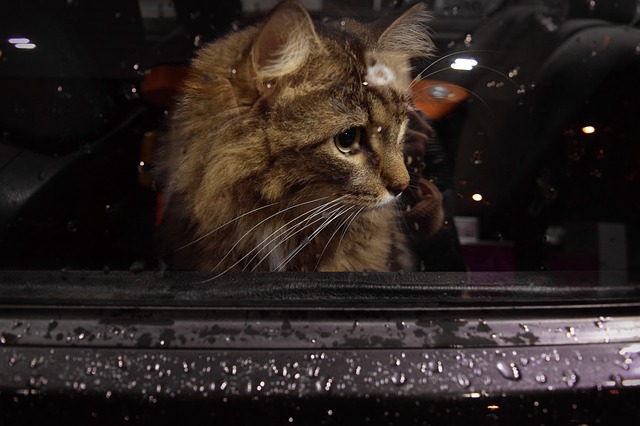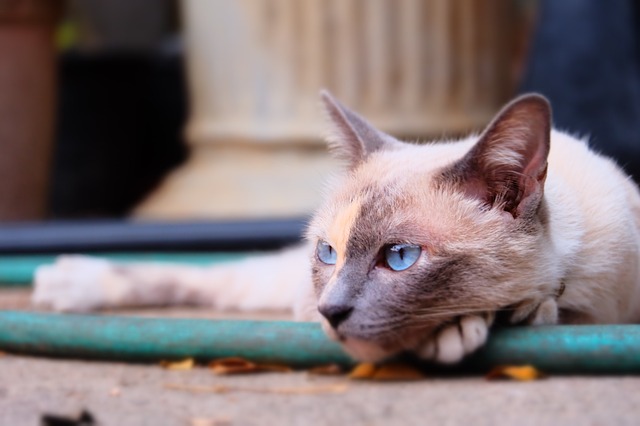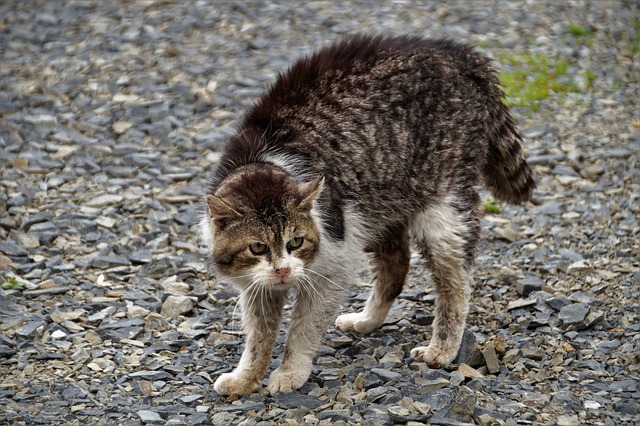We’ve all been there. You snuggle under the covers ready to get some quality sleep, when all of a sudden, you’re startled awake by your cat pouncing on you, smacking your face with her claws and paws. And not playful, purry pounce but a full combat attack! It can be bewildering and dead scary for any cat owner.
Sneak attacks by a cat at night can be undoubtedly and incredibly painful, irrespective of how adorable your furball is. It can also come as a bit of a shock, particularly if it happens when you are sleeping.
If you’ve tried to get your kitty to stop attacking you at night, you know it is not a walk in the park. But why does your feline friend behave this way in the first place? Well, here are the top probable reasons why your cat can attack you at night.
1. Your Cat is in Play/Hunting Mode

Let’s begin with the age-old explanation: your cat is a nocturnal creature, so when the sun sets, her hunting instinct kicks in. She is ready to hunt on anything on the move (including you) until dawn.
Most felines are also naturally crepuscular, which simply means that they are active at dawn and dusk. So, it shouldn’t surprise you that your kitty is awake and active when you are asleep. In fact, sleeping at the time you do is an acquired behavior that only comes easy for your cat as she grows older.
You might also be the reason your cat can’t stop pouncing on you at night. Do you wiggle your feet or body below the covers? Or twitch your eyes while asleep? If yes, your body is like an alluring toy that makes your kitty want to play. Your cat interprets the movement as a disconnect from you and her instincts consider the part of the body that’s moving (your foot or hand) to be a prey or a threat. As a result, the cat is prompted to use her claws (and even teeth) to complete the attack.
But why do cats go for your feet and hands in particular? Well, your feet and hands happen to be the perfect size and shape for a cat’s preferred prey. According to International Cat Care, cats tend to go for small-sized prey that they are capable of catching on their own (since they are solitary hunters).
2. Your Cat Hates Your Snoring Habits
Another reason why your cat may be attacking you at night could be that you are doing something unpleasant to her while you are asleep. We’ve heard stories of cats biting owners when they snore or when their sleep apnea happens.
Generally, cats often respond to certain sound frequencies with aggression. Perfect examples of such sound frequencies include other cats meowing, baby cries, whistling, or other high-pitched sounds. One possible explanation of this behavior could be the elicitation of their predatory instincts by high-frequency sounds. It could also be due to the fact that the sudden noises are disturbing or catch our feline friends off-guard, prompting them to attack.
So, while you may be quick to blame your kitty and her aloof mentality when she attacks you at night, perhaps it is you who is doing something irritating to her. To be certain that your snoring habits may the reason why your cat attacks you, consider setting a camera to record yourself as you sleep.
3. Your Cat Is Dead Bored
Cats spend up to 80 percent of their day asleep, so they always have a lot of energy to spare. And if they don’t get enough play, they will get bored and wake you up to play.
In fact, if your cat is always indoors with no playmates, she will start looking forward to your coming home and assume that’s the only time for fun play. So, during the day, she’ll lazy around and sleep throughout to ensure she’s active for night games.
And if you come home but unable to help her burn off some of that pent-up energy during the day, she will find ways of getting it out—one of which will be to engage or attack you. ASPCA also posits that play aggression is often amplified when cats stay alone for long hours without opportunities to play.
Tip: Take an hour before bedtime to play with your kitty. There are numerous cat-friendly toys that you can use to spruce up your night games. (Remember to rotate them on a daily basis to keep your cat interested). Better still, you can get another cat to keep her company or schedule outdoor breaks for playtime with other cats. But you’ll need to observe your cat’s body language to ensure she’s not getting bullied by other cats.
4. It Could External Stimulus (Redirected Aggression)

Redirected aggression occurs when a cat becomes agitated by an external stimulus (a strange person, animal, or situation) and then unleashes the anger onto you. Here is a quick breakdown of how it works: your cat spots another cat, bird, or squirrel outside your window. She becomes agitated by these animals. Unfortunately, she can’t chase or take action because she is indoors. As a result, she looks for something else to lash out her frustrations and redirect her agitation. In most cases, you become this ‘something else’ or the subject of her anger!
Related Posts:
How Much Hissing is Normal when Introducing Cats
Cat Depression After New Kitten: Does It Exist? (Plus How to Deal with It)
5. Your Cat Is In Pain
Does your cat show a sudden drastic change in behavior (unexpected biting or scratching)? You should consider checking up with a veterinarian. Your cat might be going through excruciating pain from undiagnosed medical problems like arthritis, internal parasites, dental issues, or other conditions. When a cat is experiencing some form of pain or anxious of a situation, she will instinctively protect herself, which can lead to aggression. (Any slight nuisances could trigger an attack).
Besides pain, factors like hormonal changes (in intact cats), loss of normal sensory input, biochemical imbalances, cognitive decline, and neurological problems could also lead to aggression in cats. Older kitties are also often more restless when they experience loss in eyesight and hearing ability. This interferes with their sleep and they’ll wake you up in the hope you’ll fix their ailments. Bottom line: knowing your cat’s health will help you understand better the reason behind her night attacks.
6. Your Cat’s Trust Is Broken
Does your cat show episode of PTSD symptoms such as hyperactivity to ordinary noises like a vacuum cleaner or toilet flush? Or have you witnessed your cat manifest the following behaviors before she attacks you: She swings her tail from side to side, eyes dilated, whiskers sharply elongated forward and her stance exaggerated to make her look bigger?
Well, you may be dealing with a feline version of a neglected child who sometimes develops reactive attachment disorder. Probably the cat mistrusts her interactions with humans at night resulting in a push and pull behavior.
Don’t be surprised: cats can also suffer from post-traumatic stress. Our feline friends’ brains are wired just like ours, and past traumatic experiences (like human violence, physical punishment, or struggles to survive on the street at night, etc) can make them become aggressive.
This is common with adopted or rescued cats and it might be a fear response beneath the aggressive stance since they haven’t been socialized to know the limits of claws and teeth during play or when interacting with humans at night.
7. Your Cat Is Looking For Your Attention

Cats are peculiar creatures and when they want your attention, they will stop at nothing until they get it. If your feline friend wants to play, she won’t bother to understand that you are trying to sleep. All she will care about is that she can see you. So, whether it is jumping at your feet, ankles, or biting you a bit, she will try them all to get your attention.
Perhaps the question you should ask yourself is why your cat wants your attention at night. That’s for you to figure out but there are basic needs felines have that you should probably think about, including food, the urge to go out, and the need to let out their excess energy (lack of play).
Tip: If you suspect that your cat is attacking you at night because she craves your attention, consider giving her warm milk before bedtime or feeding her late in the evening instead of early morning. Set an hour off for playtime at night to wear her out and get her sleepy when you want to wind down.
8. Your Cat Has Detected Unfamiliar Odors on You
Cats are very sensitive to smell and just a whiff of unfamiliar odor on you could trigger anxiety and fear, which leads to aggression. Some cats will probably run for the hills if they smell, hear, or see something that scares them. However, others will attack or turn to other forms of aggression as an outlet for fear. Your kitty may become vicious especially if the scent is of an unfamiliar cat or pet you may have come in contact with during the day.
Be Patient, There Is Hope
Sudden attacks at night by your kitty may frustrate you or make you feel desperate, particularly if she used to be affectionate and cuddly around you. However, always keep your cool and be patient.
Regardless of the reason why your cat attacks you, she doesn’t see it as something wrong. Secondly, you are the easy-to-access target of her aggression because you are her constant companion. Your tendency to easily fuss over her when she becomes agitated also makes you more susceptible to her aggressive tendencies than no one else.
The good news is that felines are very adept at learning and can be easily trained to avoid certain behaviors, so don’t despair. Neither should you harbor any bad feelings towards your kitty or punish her because that would further strain your relationship.
Stay in control and in no time, she will be back to her normal state, especially if you can quickly identify and correct the potential triggers of her behaviors.
Most importantly, consider talking to your vet about your cat’s tendencies. Sometimes certain underlying conditions can induce aggression and medical attention may come in handy in such situations. A vet may also refer you to a pet psychologist who may assist you or help you formulate a diet plan that may prove to be useful.

Hi! I am Eleanor Price. I started this website after my cat, Louie, almost died from a case of botulism (a type of food poisoning often caused by bacteria that grow on food items). Turned out that my cat’s diet was the problem. I have made it my duty to provide the best information and recommendations about everything cat lovers need to know about their felines’ health and wellbeing. My goal is to find the most informative content on anything feline-related and share it with fellow hardworking kitty lovers.

